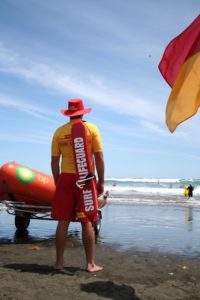
As Kiwis head out in droves to enjoy New Zealand’s beaches, rivers, lakes, swimming pools and other water spots these holidays, Surf Life Saving New Zealand, Coastguard and Water Safety New Zealand are urging people to think about water safety for themselves, friends and family.
Water Safety New Zealand CEO Jonty Mills says drowning remains the number one cause of recreational death and the number three cause of accidental death in New Zealand with 92 preventable fatalities in 2017.
“It’s our hope every family makes water safety a priority this summer. Have a discussion about water safety ahead of the holidays. Visit www.watersafety.org.nz and do a refresher on staying safe in all our different aquatic environments” says Mills.
“If you’re going on holiday with small children check properties for water hazards and make sure pool gates and latches are in good working order. However the only fool-proof solution is constant active adult supervision and keeping toddlers at arm’s length at all times around water.”
Surf Life Saving New Zealand CEO Paul Dalton echoes Mr Mills’ sentiments and adds that “choosing a lifeguarded beach and swimming between the flags is the best way to ensure the safety of your whole family at the beach this summer,” with volunteer surf lifeguards patrolling over 90 locations around the country.
“We also encourage adults to keep children within arm’s reach at all times. The conditions at the beach can change rapidly and children can get into trouble very quickly, so it’s always best to stay close enough to grab them just in case they do get into trouble.”
Mr Dalton also encourages people to search for patrolled beaches at www.findabeach.co.nz where they can see patrol locations, patrol times, and facts about their favourite local beach.
“There is no doubt swimming between the flags is the safest place to swim and findabeach.co.nz is the best way to find where the lifeguarded beaches are.
“We also encourage having a chat to your local surf lifeguards when you arrive at the beach as they can help you understand what is happening at the beach, and maybe even help you learn to spot where a rip current is,” he added.
Coastguard CEO Patrick Holmes says wearing a lifejacket is key to staying safe when out on the water. “Lifejackets save lives, but old lifejackets are no good in an emergency,” he says.
“Lifejackets more than 10 years old should be replaced even if they look fine. People need to be aware lifejackets don’t last a lifetime and do deteriorate over time due to exposure to seawater, sun and general wear and tear.”
Coastguard’s Old4New Lifejacket Upgrade campaign is currently touring the country enabling people to trade their old, damaged, or out of date lifejackets for a great discount on a brand-new, quality Hutchwilco lifejacket. Since the campaign launched three years ago, over 10,000 old or damaged lifejackets have been traded in and upgraded, meaning thousands of Kiwis are now safer out on the water. Find out more at www.old4New.nz
Mr Holmes also urges boaties to take two separate forms of waterproof communication, check the weather forecast, avoid alcohol and skipper responsibility.
“It is up to the skipper to ensure the safety of everyone on board, including having suitable lifejackets, and staying within the limits of the boat,” says Mr Holmes. “This reduces the chance of anything going wrong and will help keep people safe out on the water this summer.”
While enjoying the water is part of New Zealand’s way of life, the dangers are real and things can change quickly.
This summer everyone needs to remember the four rules of the Water Safety Code and avoid alcohol while taking part in aquatic activities.
1. Be prepared
2. Watch out for yourself and each other
3. Be aware of the dangers
4. Know your limits








